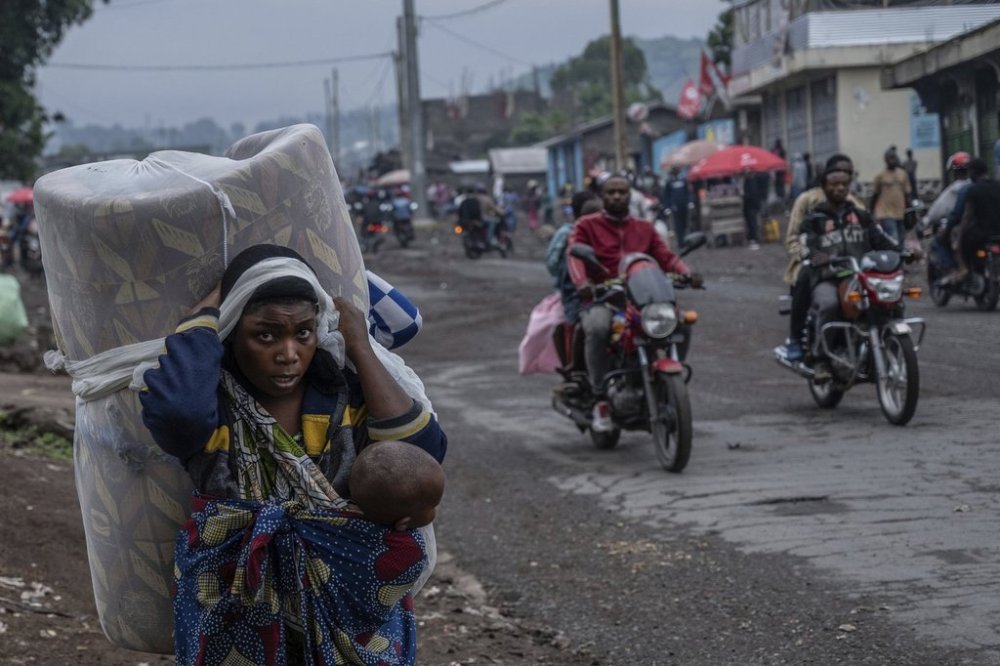UN experts say Rwanda supported rebels in Congo and smuggled minerals at ‘unprecedented levels’
Advertisement
Read this article for free:
or
Already have an account? Log in here »
To continue reading, please subscribe:
Monthly Digital Subscription
$0 for the first 4 weeks*
- Enjoy unlimited reading on winnipegfreepress.com
- Read the E-Edition, our digital replica newspaper
- Access News Break, our award-winning app
- Play interactive puzzles
*No charge for 4 weeks then price increases to the regular rate of $19.00 plus GST every four weeks. Offer available to new and qualified returning subscribers only. Cancel any time.
Monthly Digital Subscription
$4.75/week*
- Enjoy unlimited reading on winnipegfreepress.com
- Read the E-Edition, our digital replica newspaper
- Access News Break, our award-winning app
- Play interactive puzzles
*Billed as $19 plus GST every four weeks. Cancel any time.
To continue reading, please subscribe:
Add Free Press access to your Brandon Sun subscription for only an additional
$1 for the first 4 weeks*
*Your next subscription payment will increase by $1.00 and you will be charged $16.99 plus GST for four weeks. After four weeks, your payment will increase to $23.99 plus GST every four weeks.
Read unlimited articles for free today:
or
Already have an account? Log in here »
DAKAR, Senegal (AP) — Rwanda provided “critical” support to the M23 rebels’ recent offensive in eastern Congo, which helped secure Kigali’s access to minerals and fertile ground, according to a confidential United Nations report seen by The Associated Press.
The Rwanda-backed M23 rebel group is the most prominent armed group in the conflict in Eastern Congo, which has been in and out of crises for decades. The rebels earlier this year advanced and seized the strategic city of Goma and Bukavu in a major escalation of the conflict.
Rwanda has denied any involvement. But U.N. experts say Kigali provided backing to the rebels with an aim to “control the territory of the DRC and its natural resources,” using “advanced military equipment, including jamming systems, short-range air defense system and armed drones.”

Rwanda has been accused of exploiting eastern Congo’s minerals, used in smartphones, advanced fighter jets and much more, which Kigali denies. The report said that smuggling of coltan, considered a critical mineral, from M23-controlled territories in recent months reached “unprecedented levels.”
“Evidence indicated increasing risk of cross-border fraud as minerals from North Kivu, particularly coltan from the AFC-controlled Rubaya mine, continued to be smuggled to Rwanda.” the report said. “These minerals were then mixed with production of Rwandan origin and exported downstream.”
AFC, or Congo River Alliance, is an umbrella groups which includes M23.
The M23-controlled Rubaya mines produce coltan — short for columbite-tantalite — an ore from which the metals tantalum and niobium are extracted. Both are considered critical raw materials by the United States, the European Union, China and Japan.
Tantalum is used in mobile phones, computers and automotive electronics, as well as in aircraft engines, missile components and GPS systems. Niobium is used in pipelines, rockets and jet engines.
Congo produced about 40% of the world’s coltan in 2023, according to the U.S. Geological Survey, with Australia, Canada and Brazil being other major suppliers.
Part of the minerals smuggled to Rwanda were purchased by Boss Mining Solution Limited, a Rwandan company. To justify the plausibility of domestic origins of tantalum, tin and tungsten, the Rwandan Development Board declared annual domestic production of 8,000 to 9,000 tons of these minerals, the report said. The figure was contradicted by the National Institute of Statistics, independent geological studies and ITSCI.
Late last month, Rwanda and Congo signed a peace deal facilitated by the U.S. while helping the U.S. government and American companies gain access to critical minerals in the region. But experts said they don’t believe it will quickly end the fighting because the most prominent armed group says it does not apply to it.
Rwanda denied the allegations from the U.N. report.
Alluding to the U.N. report, Rwanda’s president Paul Kagame told reporters on Friday:“The expertise they provide, the reports they write actually do not have anything to do with the situation itself. These reports were written long ago — long ago when they were given the mission.”
A spokesperson for Rwanda’s government, Yolande Makolo, wrote on X that “Following the signing of the US-brokered Peace Agreement last Friday, Rwanda is fully committed to its implementation.”
The report, which was first reported by Reuters, was submitted to the U.N. Security Council sanctions committee for Congo earlier this week, and will be published shortly, said a U.N. official who was not authorized to speak on the matter publicly.
Despite Congo’s exceptional mineral wealth, over 70% of Congolese live on less than $2.15 a day. The conflict in the country’s east has created one of the world’s largest humanitarian crises with more than 7 million people displaced, including 100,000 who fled homes this year.
The U.N. report also accused all sides in the conflict of human rights violations, including reprisal killings on suspicion of collaboration of the opposing sides.
Rwanda and M23 are responsible for “systematic campaign of repression in occupied areas, including extrajudicial killings, arbitrary arrest, torture, enforced disappearance and raids in hospitals,” it said. Retreating Congolese soldiers and members of the pro-government militia “committed looting, sexual violence and killings.”
___
Associated Press writers Wilson McMakin in Dakar, Senegal and Rodney Muhumuza in Kampala, Uganda, contributed to this report.

